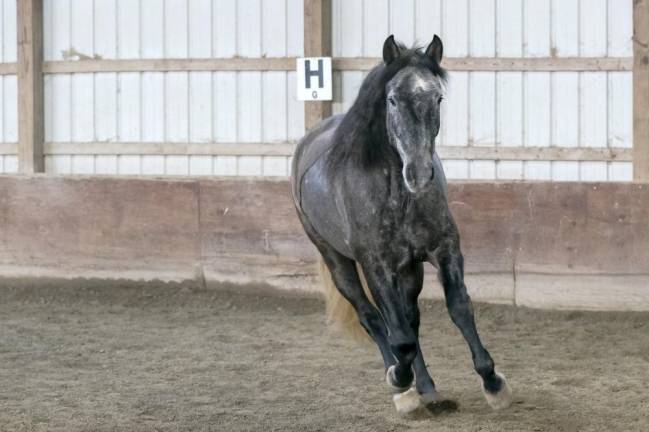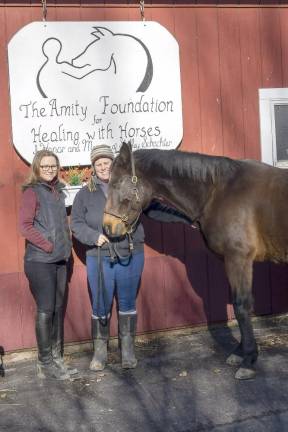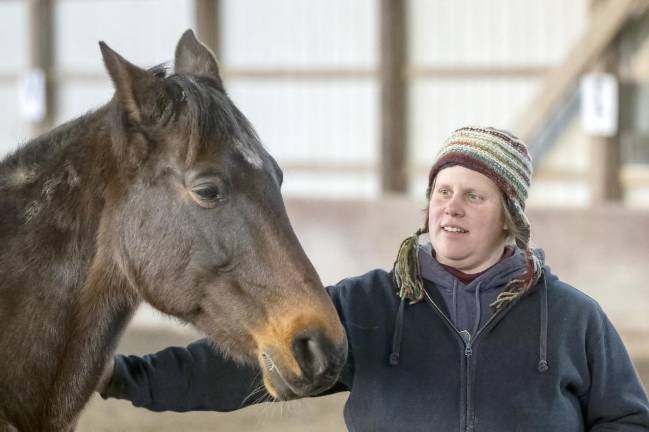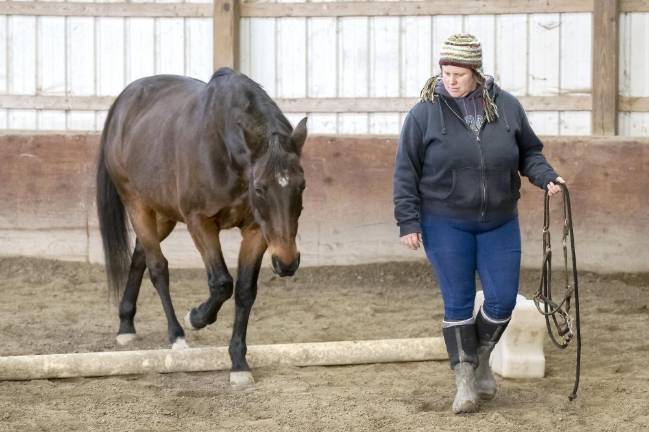How horses help with trauma
Families of war veterans receive ongoing mental health help through the Amity Foundation for Healing with Horses. Four women talked about their experience with that process.






When families of war veterans gather around the table to celebrate the holidays, many will rejoice that their family is together once again. Some, however, will be grieving the loss of those who died in combat, while others may find that their loved one may be there physically but not in spirit because they have been changed by traumatic experiences.
“Trauma changes lives,” says licensed mental health therapist Corey DeMala, who, along with equine specialist Christine Swanson Dykshoorn, co-directs the Amity Foundation for Healing with Horses. “And the shock of trauma may live for years and even a lifetime—altering the life of the person immediately affected and the lives of everyone in relationship with them as well.”
In addition to being a therapist, Corey is a life-long horse trainer who augments her practice with the healing power of horses. She explains that horses are herd animals whose survival depends on having good relationships, with other horses as well as humans. Since horses are also prey animals, they have an innate ability to perceive potential danger. If they feel threatened, they react immediately—often by running away—whereas if they sense no imminent danger, they are relaxed and graze contentedly. “Their ability to respond to a person’s body language and emotional state without judgment makes them ideal assistants for a range of emotional and psychological problems and disorders, including PTSD,” she says. Unlike therapeutic riding, equine-assisted psychotherapy does not necessarily involve riding a horse, although it can.
When clients work with horses, they learn the importance of real connection in relationships, Corey says. “The quality of our relationships greatly impacts the quality of our lives. After all, humans are herd animals too—but we’re not born with the instincts that horses have. Sometimes, we have to learn how to create healthy, happy relationships. Reaching out for connection is risky and can trigger feelings of vulnerability, fear, anxiety—and even anger and frustration. Trauma in our past can make the job even harder.”
Following an Amity workshop for women affected by trauma, four attendees expressed interest in working with horses therapeutically. They were grateful to learn that their sessions could be covered by donations from the community as well as from a group of volunteers dedicated to helping veterans and their families.
Caroline, a single mom with horse-loving nine-year-old twins, felt that equine therapy could help her growing daughters. In the past, she had heard accounts of what vets had endured in combat. After counseling sessions with Corey, she came to realize that listening empathically to those accounts over an extended period of time had contributed to her own diagnosis of PTSD. “It’s as though the stories actually happened to me,” she said.
Another participant, Simone, initially just wanted to watch the horses interact and relate her observations to Corey. “I was frightened by their size,” she said. Working primarily with a horse named Rockstar, she began to become much more aware of her own sensations and feelings. “It was as though he could feel my nervous system,” she said. “If I was tense, he might back away, which would make me even more tense.” Simone learned ways to manage her feelings—to find calm and confidence. As she did, Rockstar responded in kind. Simone would eventually apply what she learned in the arena to her interactions with people.
Mary Ann got involved in the program along with her 16-year-old son. “When it came to our sessions, it often felt like horseplay. But it had a purpose,” she said. Mary Ann and her son worked with a horse named Beau. “Beau seemed to mirror our feelings. He showed us that when we slowed down, we could really listen to each other. There was always a takeaway,” she said. “Later on, my son and I could apply those lessons—it helped us talk to each other.”
Brianna came to Amity to overcome debilitating anxiety. Over time, as Brianna worked with a number of Amity horses, her fears abated as her interest in horses increased. Eventually, she approached Amity’s Co-Director, Christine, whose expertise in handling Amity’s horses runs the gamut from teaching horsemanship to animal husbandry, and expressed her desire to learn more.
When Christine asked what her goals were, Brianna said, “I couldn’t believe hearing myself say, ‘Grooming, tacking up and pleasure riding,’”
Christine saw marked improvement in what Brianna once called her “big three” issues—trust, security and safety. “She is more confident around the horses, and they connect with her. Now she’s looking for a horse of her own.”
The women described changes they have noticed since they began working with Amity and the horses several months ago. Simone says she sometimes find herself staying unexpectedly calm in the middle of a challenging circumstance, and Caroline celebrates how she and her daughters “have never been closer.” Brianna says she now knows “what it feels like to be confident in myself.”
“Amity has helped me know myself better,” she said. “That has helped me to feel safer and more secure in all that I do.”
Horses’ ability to respond to a person’s body language and emotional state without judgment makes them ideal assistants for a range of emotional and psychological problems and disorders, including PTSD. - licensed mental health therapist Corey DeMala.